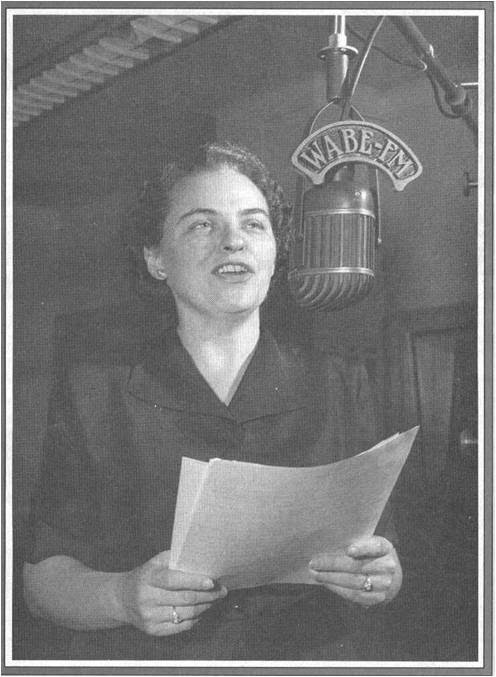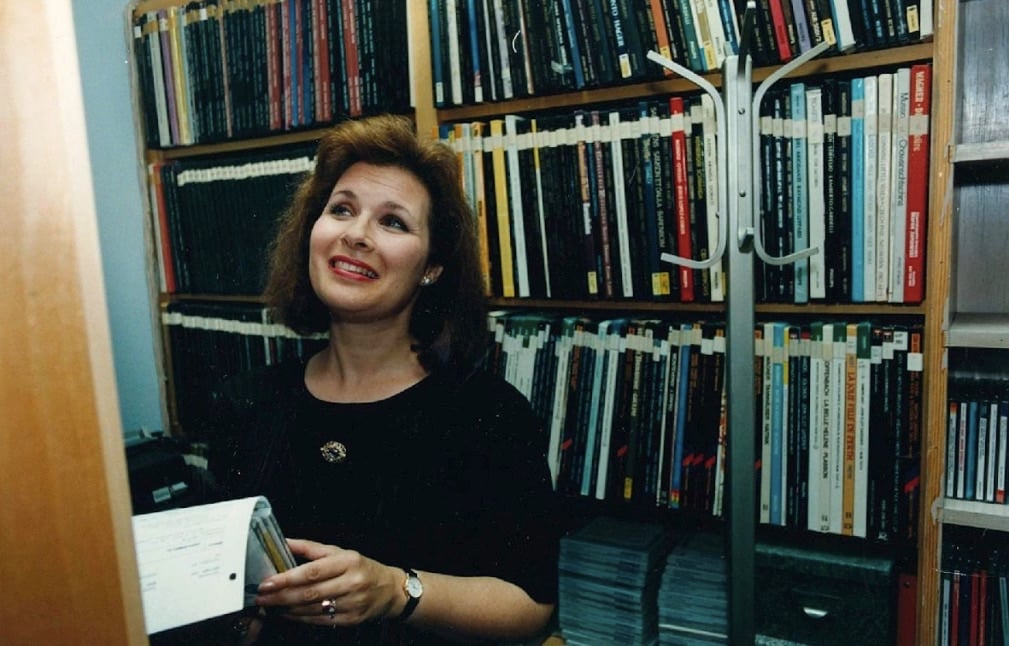Atlanta’s WABE radio, 90.1 FM, made its air debut on September 13, 1948. It was a notable year for world and local news, and major events occurred in the arts world as well.
The United Nations adopted the Universal Declaration of Human Rights in 1948. Israel was declared an independent state, and pacifist leader Mahatma Gandhi was tragically assassinated. In Atlanta, eight African-American officers were accepted into the police force; an important first, though these pioneering men were forced to perform their duties under a long list of jaw-dropping restrictions.
Cole Porter’s Kiss Me, Kate hit Broadway that year. Classical music got a boost at New York’s Waldorf Astoria as Columbia Records unveiled the “long play” vinyl record, capable of capturing over twenty minutes of music per side (Mendelssohn’s Concerto in E Minor for Violin, performed by Nathan Milstein and the New York Philharmonic under Bruno Walter did the honors).

Closer to home, the NBC radio network presented Atlanta Symphony Orchestra’s first-ever broadcast in a special concert performed at Emory University.
For 75 years, this mix of news, music and innovation has typified WABE’s operations, even if emphasis on those various elements has shifted over time. The non-commercial station was one of the earliest to become an affiliate of NPR, its license granted to the Atlanta Board of Education — hence the station’s call letters.
WABE’s early years were mostly concerned with public educational programming, while classical music with a smattering of news later became the primary format. Classical music has more recently largely shifted to WABE’s HD radio substation, though arts coverage remains on FM through Lois Reitzes’ program City Lights.
The station also boasts continued programing from Atlanta favorites H. Johnson and Rose Scott, as well as the award-winning Buried Truths with Hank Klibanoff. WABE also boasts a Pulitzer, two Peabodys, and a slew of other awards.
Anniversaries are a time of reflection, however, and WABE’s staff does so with pardonable pride. CEO Jennifer Dorian describes herself as a “social entrepreneur” whose raison d’être is to ensure that this non-profit station continues to survive and serve Atlanta.
“I am drawn to this work because I want to have an impact in my community, I want to know every side and angle of Atlanta,” Dorian says. “This job has met that ideal in every way.”
Dorian grew up in Atlanta, and listened to WABE and particularly Reitzes. “Even as a teenager I loved hearing a local voice talk about the arts,” she says. “Now we have a beautiful blend of national and local content. Shows like Lois’s City Lights and Rose Scott’s Closer Look are the crown jewels of WABE and emblematic of our service and impact.”
Reitzes is one of Atlanta’s crown jewels herself. Her husky contralto has been heard on WABE since 1979, making her the station’s longest-running host. A graduate of Chicago Music Conservatory and Indiana University School of Music, she has variously served as program manager and hostess of such venerable WABE programs as Second Cup Concert, City Lights, and the Spivey Soiree. Alliance Theater’s former Artistic Director Susan V. Booth dubbed Reitzes “the wise and doting fairy godmother of our cultural community.”

Reitzes’ memory is long and succinct. “Initially, the station broadcast instructional programs that were heard in Atlanta’s classrooms,” she says. “In the early 70’s, there was a commercial classical music station that was sold and took on a different format. Their music director Jonathan Phelps became music director for WABE.”
“Phelps helped shift the format and sound of the station,” Reitzes says. “WABE began to carry the Met, and Atlanta got to hear live broadcasts of major orchestras around the country. In 1974 Phelps signed a contract with ASO; we have been broadcasting them ever since. In fact, that is the only classical we still run on FM. Initially the only NPR news program was All Things Considered, then Morning Edition began in 1979. The classical formal continued, though some adjustments were made for those programs and for the phenomenon that was Prairie Home Companion.”
In 2015, WABE switched from classical music to a full news and talk format. The wails of disappointment from classical listeners were formidable and continue in part to this day. “It was very complicated,” Reitzes says tactfully.
Complicated indeed, but the needs of the larger community were at issue. “Imagine that we were a top ten city and only had NPR in the early morning and evening,” Dorian says.
She thinks the WABE leaders who made the decision in 2015 were brave. The station dedicates an HD radio channel to classical music, and still broadcasts the Atlanta Symphony Orchestra every Sunday night.
“We’re still very committed to the arts and do a good job beating the drum for classical, but I don’t think we could afford to be all classical in the 2000’s,” says Dorian. “Ratings improved and so did the representation of our overall community. Our listenership is now 35 percent African American, 52 percent Caucasian and 11 percent Hispanic. We are more reflective of our audience.”
Reitzes says the station wants to offer the best of both music and news, while also amplifying the arts. When she first heard the station was going to a full news/talk format, she thought her days at the station were numbered. But the CEO at the time, the late John Weatherford, told her, “Lois, arts and culture is news.”
“Something this station has done beautifully has been to elevate more local arts voices,” says Reitzes. “Before, I might have had a five-minute interview about something going on at Alliance; now I can do 25 minutes. Being able to amplify so many different voices in the arts community has been a privilege. We have marvelous content, and local arts organizations have an audience they would not have otherwise.”
Whatever their opinions on format, the WABE experience has been so enriching that identifying favorite moments is challenging. “There are so many,” Dorian says. “As we create more of our own content, I feel like our studios are coming back to life. I am proud of that. We recently filled a Decatur church with 700 people for a taping of Buried Truths about the racially motivated cold case murders in South Georgia. Hank Klibanoff spoke with the descendants of the victims and perpetrators. You could have heard a pin drop as they shared their experiences. It gave you chills. That was a proud moment.”

Reitzes jokes that discussing her own reminiscences “would keep us here all night.” But she particularly treasures her friendship with actor Carroll O’Connor, famous for portraying the bigot Archie Bunker in All In The Family. He lived in Atlanta while working on the television series In the Heat of the Night. “He was a listener,” she says. “I played a recording with Eubie Blake one night. O’Connor loved it and wanted to know more. Can I tell you what a trip it was to get that phone call in the control room?”
The two became friends. Reitzes discovered O’Connor had a deep knowledge of classical music, especially the American masters like Howard Hanson. “He was a very liberal man, and rather shy,” she says. “I think he was so good at portraying bigots because those qualities were everything he abhorred. He was interested in the civil rights history here. When O’Connor passed away his wife, Nancy, asked that I speak at the memorial for him. And this all happened because of music and WABE.”
And what of the future?
“My hope,” Reitzes says, “is that people will realize that the service we provide is as much a pillar of our community as a brick-and-mortar institution.”
WABE’s tagline is “Amplifying Atlanta” and Dorian says the station takes that motto seriously, particularly in news coverage. Its newsroom of 26 people generates 2,000 stories a year, and around 250 of those are picked up by NPR. For WABE, the future is local content and growth in podcasts, digital content and streaming.
“There is a saying here: ‘Atlanta influences everything’,” says Dorian. “We see that in public health, in politics, in technology, and in demographic trends in the United States. Atlanta looks like the future of America demographically. That makes WABE important. When we serve Atlanta well, it has relevance to the whole country.”
::
Mark Thomas Ketterson is a Chicago-based arts critic and writer. He was the longtime Chicago correspondent for Opera News and has also written for Playbill, the Chicago Tribune and other publications.

